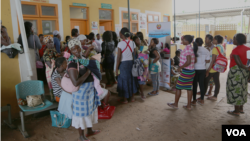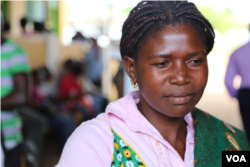Mozambique has one of the world’s highest rates of cervical cancer, a disease that kills 4,000 women there every year. A new plan to vaccinate 10-year-old girls could turn the tide in the fight against a devastating illness that is widening an already gapping gender divide in some of the globe’s poorest countries.
Cecilia Arnaldo shifts her weight from foot to foot as she joins scores of other women waiting to be seen by nurses at a clinic in Boane. The 34-year-old mother of five, describes having “womb wounds” for seven months but today is the first time she will undergo cervical screening and treatment.
She said she came today because various TV programs have information on cervical cancer screening. “All I want is to be healthy” she said, “so I am not ashamed.. Women are getting lost and they can even die just from being ashamed.”
Dr. Khatia Munguambe at the Manhiça Health Research Center said in rural areas, cervical cancer is often linked with promiscuity and witchcraft preventing women from seeking help. “There is a perception that the people who suffer from cervical cancer are mistresses whose husbands’ wives found out that they are cheating," she explained. "So the wives send witchcraft to them [the mistresses] and they become ill. So that’s a problem that needs to be addressed. If you attach cervical cancer to this sexual behavior, people will be stigmatized.”
Munguambe said women who have advanced cases often isolate themselves, embarrassed of their physical symptoms. If the cancer progresses to later stages - it is deadly for most, The criterion for cancer treatment is prohibitive and palliative radiotherapy is not available for the poorest.
At the Boane clinic, Jhpiego, a non-profit health organization, has integrated screening into HIV-related health services. Screening programs can detect precancerous lesions in nearly 90% of cases.
Cecilia undergoes a procedure called acetowhitening whereby infected cells turn white when they are painted with vinegar. In the same visit, nurses perform cryosurgery where they freeze off the cells with liquid nitrogen.
Ninety-nine percent of cervical cancers are caused by HPV - the most common sexually transmitted disease according the Center of Disease Control. In Mozambique, cervical cancer rates are exacerbated by the high prevalence of HIV - a weak immune system allows HPV infections to rapidly progress to cancer.
Two vaccines have been developed which scientists believe could prevent 70 to 80 percent of cervical cancer cases.
Mozambique is currently conducting a demonstration of the vaccine in two districts. GAVI vaccine alliance is subsidizing the cost to developing countries, charging the poorest just 20 cents a dose.
Ten-year-olds are receiving the vaccine before they become sexually active and come into contact with HPV.
Munguambe said educating teachers and community leaders - highly regarded by parents - about the vaccine is key in these trials. HPV was often confused with HIV so they decided to focus on the disease the vaccine would prevent.
“The most challenging thing was to get to that term to learn what is cervical cancer locally…we [then] framed the message so we are not encouraging girls to be sexually active but we are saying that if you get vaccinated today, it means in the future, when you are reproductive age you will have sound reproductive health," Munguambe stated.
The vaccine will be administered primarily through schools, in combination with community-based mobile brigades to target those not in school.
Mozambique has just completed the first round of vaccines. Successful trials could see Mozambique rollout the HPV vaccine to the rest of the country in 2016.
Gillian Parker traveled to Mozambique with the International Reporting Project





